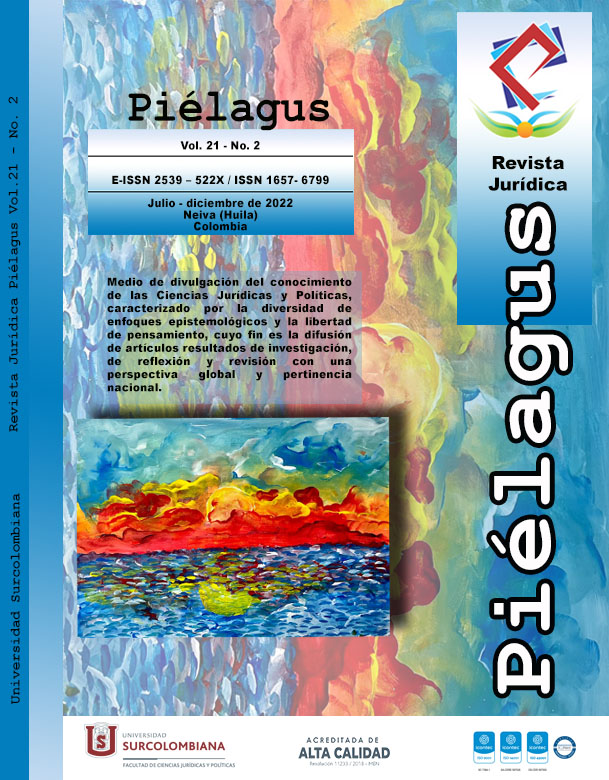Interpretative conflicts in the Colombian judicial system
##plugins.themes.bootstrap3.article.main##
The debate on interpretative conflicts in constitutional matters is a subject of continuous relevance, not only in Colombia but also in countries where there is a constitutional justice system that is strongly active in the protection of fundamental rights and in the defense of the constitution. The power to create law through the interpretation made by constitutional judges in very specific problems is a very complex issue since it involves applying constitutional regulations to cases, seeking the integration that will allow them to find the solution to the issue in question. This article, product of jurisprudential research, addresses the problem of judicial interpretation, specifying it in terms of interpretative divergences of the high Courts in Colombia, which has implied the reconfiguration of the classic scheme of the balance of powers and consequently the existence of conflicts between the powers.
Downloads
##plugins.themes.bootstrap3.article.details##
REFERENCES
I. ACOSTA RODRIGUEZ, Joaquín (2016): “La interpretación constitucional: entre legicentrismo, neoconstitucionalismo y constitucionalización”, Review IUS, Instituto de Ciencias Jurídicas de Puebla México vol.10 no.37 pp.83-102
II. ALBARRACÍN, Mauricio and LEMAITRE RIPOLL, Julieta (2016): “La cruzada contra el matrimonio entre personas del mismo sexo en Colombia”, en SÁEZ Macarena, and MORÁN FAÚNDES José Manuel (Edit.), Sexo, Delito y Pecados, Intersecciones entre religión, género, sexualidad y el derecho en América Latina, (American University, Center For Latin American & Latino Studies), pp.91-120.
III. ARCOS-GUTIERREZ, Libia Estefany, and others (2014): "Innovación jurisprudencial del derecho procesal constitucional colombiano: efectos de sentencias inter pares e inter comunis", Revista Principia Iuris Universidad Santo Tomás de Tunja pp. 169-193.
IV. ARANGO RIVADENEIRA, Rodolfo (2016): Hay respuestas correctas en el derecho (Ediciones Uniandes-Siglo del Hombre Editores).
V. BULYGIN, Eugenio (2005): “Los jueces ¿crean derecho?” Isonomía no.18, Mexico April. Available at http://www.scielo.org.mx/scielo.php?script=sci_arttext&pid=S1405-02182003000100001
VI. MATHIEU, Bertrand (2017): Le droit contra la démocratie? (L.G.D.J Collection: Forum).
VII. CANIVET, Guy (2007) : "Activisme judiciaire et prudence interprétative: introduction générale. La création du droit par le juge" coll. Archives de philosophie du droit Nº 50 (Editorial Dalloz).
VIII. CARBONELL SÁNCHEZ, Miguel (2005): “Marbury versus Mádison en los orígenes de la supremacía constitucional y el control de constitucionalidad” Marbury versus Madison. A historic decision for constitutional justice. (Mexico, Editorial Laguna) pp. 17-33.
IX. FARRERA BRAVO, Gonzalo (2012): “La judicialización de la política. El caso de México en perspectiva comparada” Revista del Instituto de Ciencias Jurídicas de Puebla, año 6 número 30: pp.173-203.
X. FAVOREU, Louis (1996): “La Constitutionnalisation du droit, en l'unité du droit”, Mélanges en hommage à Roland Drago, (Paris, Economica) pp.25-42.
XI. FAVOREU, Louis Joseph (2001): “La constitucionalización del derecho”, Revista de Derecho, Volume XII. Vol. 12 No. 1 (Santiago de Chile, Universidad Austral de Chile), pp.31-43.
XII. FRIEDMAN, Lawrence Mier (1994): “Is there a Modern Legal Culture?” Ratio Juris Review 7(2), pp. 117 – 131.
XIII. GUARNIERI, Carlo and PERDERZOLLI Patrizia (2002): The power of judges. A comparative study of courts and democracy, (London, Oxford University Press).
XIV. GUASTINI, Ricardo (2015): "Interpretación y construcción jurídica" Revista Isonomía, Instituto Tecnológico Autónomo de México, No. 43 pp.11-38.
XV. HABERMAS, Jurgen (2000): Facticidad y validez (Editorial Trotta,).
XVI. LOPEZ DAZA, Germán (2010) : "Une nouvelle approche au principe de la séparation des pouvoirs publics dans la perspective de l’état contemporain" VIII Congrès mondial de l'Association Internationale de Droit Constitutionnel, Ciudad de México D.F. UNAM
XVII. LAMBERT, Edouard (2005) : Le gouvernement des juges (Paris, Bibliothèque Dalloz
XVIII. NOVOA MONREAL, Eduardo (2007): El derecho como obstáculo al cambio social (Siglo XXI Editores).
XIX. OLANO GARCÍA, Hernán Alejandro (2019): "Obsolescencia de las leyes en Colombia", Revista Hechos y derechos, México, Instituto de Investigaciones Jurídicas, number 53
XX. PASCAL Jan (2010) : Bloc de constitutionnalité, (éd. Jurisclasseur Administratif), septembre fasc. 1418.
XXI. POZZOLO, Susanna (1998): "Neoconstitucionalismo y especificidad de la interpretación constitucional" Doxa Magazine, Cuadernos de Filosofía del Derecho, 21-II.
XXII. RECASÉN SICHES, Luis (1973): Nueva Filosofía de la interpretación del derecho (Editorial Porrúa)
XXIII. ROBITAILLE, David (2007) : "L`interprétation judiciaire en théorie du droit comparée: entre la lettre et l'esprit" Droit prospectif: Revue de la recherche juridique Vol. 32, Nº 119
XXIV. SUPIOT, Alain (2005) : Homo juridicus. Essai sur la fonction anthropologique du Droit (Editorial Seuil)
XXV. SUSSKIND, Richard and SUSSKIND Daniel (2016): El futuro de las profesiones. Cómo la tecnología transformará el trabajo de los expertos humanos (Oxford University Press)
XXVI. MICHEL Troper (2016) : "Une théorie réaliste de l'interprétation" Opinião Jurídica Review, Fortaleza (Brazil), Centro Universitario Chistus - Unichristus, 312.
XXVII. WROBLEWSKI, Jerzy (2019) : "Legal Interpretation", in Dictionnaire encyclopédique de théorie du droit et de sociologie juridique, edited by A.J. Arnaud, J.G. Belley, J.A. Carty,
XXVIII. Schleiermacher, Friedrich, Teoría Hermenéutica completa (Institute for Comparative Studies and Globalization).
CASES
XXIX. Constitutional Court, Ruling T-983A of 2004 judge Rodrigo Escobar Gil
XXX. Constitutional Court, Ruling C-543 of 1992 judge José Gregorio Hernández Galindo).
XXXI. Constitutional Court, Ruling C-355 of 2006 judge Jaime Araújo Rentería and Clara Inés Vargas Hernandez
XXXII. Constitutional Court, Ruling C-054 of 2019 judge Diana Fajardo Rivera
XXXIII. Constitutional Court, Ruling C-308 of 2019 judge Diana Fajardo Rivera
XXXIV. Constitutional Court, Ruling C-221 of 1994 judge Carlos Gaviria Diaz
XXXV. Constitutional Court, Ruling SU-095 of 2018 judge Cristina Pardo Schlesinger
LEGISLATION
XXXVI. Political Constitution of Colombia of 1991
XXXVII. Congress of Colombia, Law 153 of 1887
XXXVIII. Congress of Colombia, Law 30 of 1986
XXXIX. Congress of Colombia, Police Code Law 1801 of 2016
XL. Congress of Colombia, Law 547 of 1999
XLI. Congress of Colombia, Law 547 of 1999
XLII. Congress of Colombia, Law 788 of 2002
XLIII. Congress of Colombia, Law 1943 of 2018
XLIV. Decree-Law 100 of 1980 Law 599 of 2000




 Perfil Google Scholar
Perfil Google Scholar













